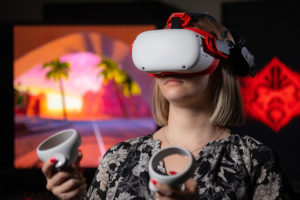ISU studies how to keep virtual reality users from getting cybersick
August 18th, 2022 by Ric Hanson
(Radio Iowa) – Researchers at Iowa State University say they’re making progress toward finding ways so people don’t get “cybersick” when using virtual reality headsets. Jonathan Kelly, an I-S-U professor of psychology and human computer interaction, says cybersickness can be temporarily debilitating — and a big turnoff toward using the technology. “It commonly includes nausea, sweating, dizziness, headache and eyestrain,” Kelly says. Earlier studies showed that more than half of first-time virtual reality headset users experienced cybersickness within ten minutes. The new I-S-U research is finding the more a person uses V-R, the less woozy they become.
“Exposure to virtual reality seems to gradually reduce this experience of cybersickness,” Kelly says. “This is similar to other forms of motion sickness, car sickness, sea sickness, where for most people, if they experienced that sickness initially, it will eventually reduce over repeated exposures.” Studies involving about 150 I-S-U undergrads found that most experienced little to no cybersickness after three V-R sessions of 20 minutes each. Kelly says there are tools that can be used to minimize cybersickness. “They generally degrade the visual information in the virtual world, but by doing so, they reduce the experience of cybersickness,” Kelly says. “So we’re interested in whether adaptation under those circumstances will also serve the purpose of adapting them to cyber sickness so we can later open up the visual world to them more fully.”
V-R isn’t just for playing video games. It’s being used in all sorts of professions from military training to health care. Since so many people get sick during their first attempts, Kelly says it makes sense to ease users into V-R. “You could imagine that someday there would be kind of a training protocol,” Kelly says. “That would gently adapt virtual reality users so that they can be immune to cyber sickness and other applications that they might explore later on.”
As internet connections improve and prices on V-R gear come down, Kelly predicts most people will at least be exposed to virtual reality either through entertainment or their jobs.






